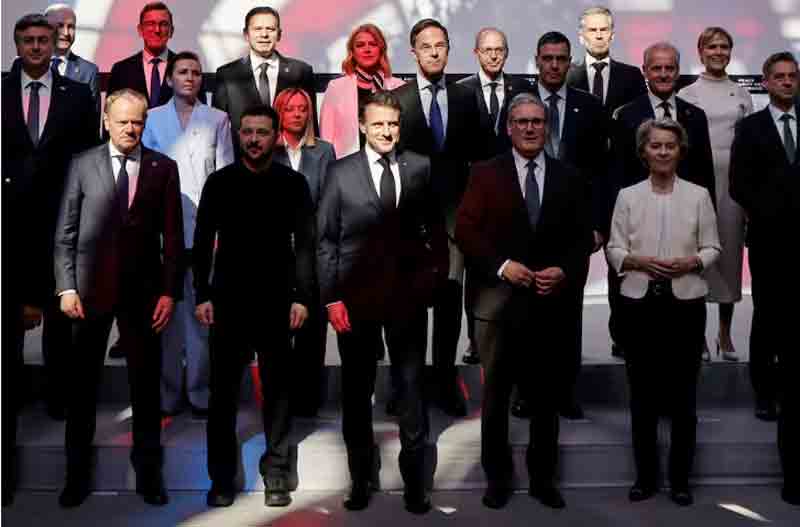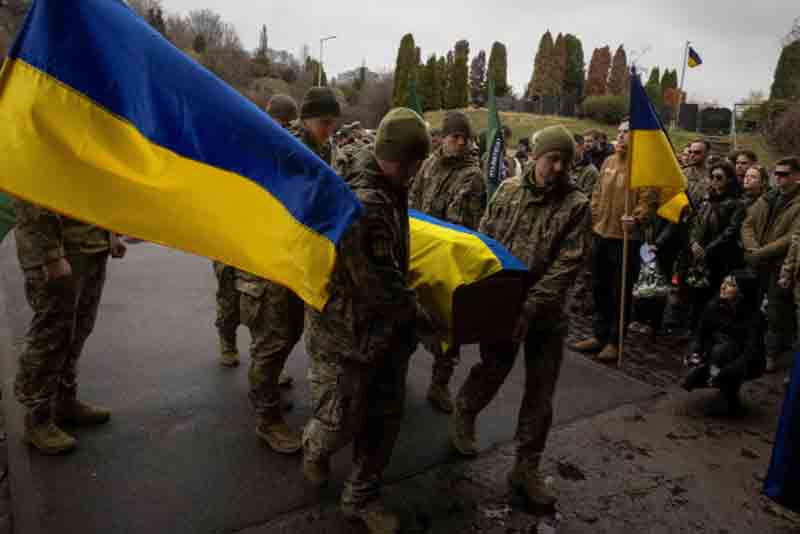European leaders reiterated their ongoing commitment to Ukraine during a summit in Paris on Thursday, yet they seemed to make limited headway regarding their potential role in providing security guarantees should a peace agreement be reached with Moscow. This marked the third gathering of what France and Britain have termed the “coalition of the willing,” highlighting concerns among European nations that the U.S. may no longer serve as a reliable source of support for Ukraine in its ongoing conflict with Russia, which has persisted for three years.
U.S. President Donald Trump, who has been in office since January 20, has expressed a desire to facilitate a quick resolution to the war. However, a series of bilateral discussions between the U.S. and the conflicting parties have not yet resulted in a significant reduction in hostilities. British Prime Minister Keir Starmer noted that leaders acknowledged the necessity for increased support for Ukraine to ensure it is in the best possible position for any peace negotiations, although he did not provide further details. He also expressed a desire to see a peace agreement emerge “in days and weeks, not months.”
European initiatives to establish security arrangements for Ukraine are shifting away from troop deployments towards alternative solutions, as they encounter political and logistical challenges, along with the likelihood of opposition from Russia and the U.S. Nevertheless, co-host French President Emmanuel Macron stated that several countries had agreed to explore a Franco-British proposal for what he termed a “reassurance force,” which would be activated in the event of a peace deal to deter any future aggression from Russia. “It was not unanimous today, as we all know, and we don’t need unanimity,” Macron remarked at a press conference. He added that military delegations would be traveling to Ukraine in the coming days to begin outlining the long-term vision for a robust Ukrainian military.
Europe faces pressure from Trump to assume a larger share of the security responsibilities in its region, but the continent’s sluggish economic growth and high debt levels have complicated this endeavor.
Macron communicated with Trump prior to the meeting, according to the French presidency. Although the United States was not in attendance, French officials indicated that the results of the discussions would be communicated to Washington.
The suggested “reassurance force” to be deployed in Ukraine is intended to provide security assurances and deter any future aggression from Russia, though there are currently few indications that the United States will extend its support.
NO SUPPORT FOR SANCTIONS RELIEF
At the summit, there was a strong consensus that easing sanctions on Russia too soon would be a strategic mistake—a condition that Moscow has stipulated for a ceasefire agreement in the Black Sea. “It was made abundantly clear that Russia is attempting to stall and engage in manipulative tactics, and we must be unequivocal about that,” Starmer stated after the meeting, alongside Ukrainian President Volodymyr Zelenskiy.
He further emphasized, “There is complete agreement that now is not the time to lift sanctions; on the contrary, we must maintain them.” Zelenskiy, who earlier this month consented to advance ceasefire discussions to facilitate the resumption of U.S. aid and intelligence sharing that had been temporarily halted by Trump, asserted that stronger sanctions against Russia are necessary. France committed to providing 2 billion euros in new military assistance to Ukraine ahead of the assembly of approximately 30 leaders.
On Thursday, Russian Foreign Ministry spokeswoman Maria Zakharova accused France and Britain of plotting a “military intervention in Ukraine” disguised as a peacekeeping operation, warning that such actions could provoke a direct military confrontation between Russia and NATO.
Italian Foreign Minister Antonio Tajani emphasized the varying perspectives among Ukraine’s allies, reaffirming his nation’s stance against deploying any military force. He stated late Wednesday, “We will not send troops on a mission unless they are part of the United Nations; this is our sole condition for deploying military personnel in Ukraine.”
Poland has already declared it will not send troops to Ukraine, and Czech Prime Minister Petr Fiala remarked on Thursday that it is “premature” to consider sending European forces until the terms of a ceasefire are established.
Discover more from Defence Talks | Defense News Hub, Military Updates, Security Insights
Subscribe to get the latest posts sent to your email.





